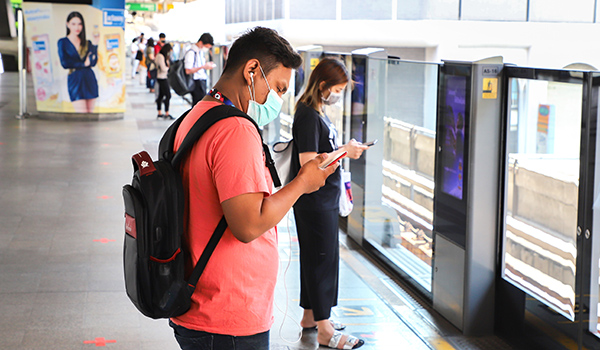
As the world slowly opens back up after COVID-19, chances are that you will have a commute coming back to work. A recent report suggests that 80% of people who contract SARS-COV-2 (the virus that causes COVID-19) will be asymptomatic and will never know they had the virus. Thus, the threat appears to be more real than ever. Because COVID-19 manifests differently in each individual, it is still going to be important to protect yourself and others. If you will be commuting to work, how can you do this practically?
According to researchers, droplets from a coughing individual can travel as far as 12 feet (twice the recommended social distancing guidelines) and will stay suspended in the air for 3 minutes.
This data highlights the need for everyone to continue to practice safety measures that protect all of us and the economy. In this post, we explore some of the best ways to reduce your risk of contracting COVID-19 as you start commuting again.
Protect yourself from COVID-19 as a commuter
Consider all the places you visit on your commute
Before you get to work, you might visit the gas station, a coffee shop, and pick up a box of donuts for your colleagues at work. If you live in a state where children are going back to school this Fall, you might have to drop them off as well.
All of these stops represent opportunities to pick up the virus. Thus, it’s important to consider practicing safety measures as you make your morning stops around town before you go to work.
- Carry sanitizing wipes with you. You can use one of these to wipe the handles of gas pumps as you fuel up. Alternatively, you could wear gloves to handle gas pumps and when you touch the payment pads that you usually find on the pumps. If you do use gloves, it is not a wise idea to reuse them somewhere else.
- Disinfect your hands regularly. If you touch a surface somewhere on your commute, disinfect your hands with your sanitizing wipes or by using the right amount of hand sanitizer. An effective hand sanitizer contains 60-70% ethanol or at least 50% isopropyl alcohol.
(Note: The US Food and Drug Administration (FDA) recently created a list of hand sanitizers that contain methanol, a chemical that is life-threatening when a person swallows it or when it is absorbed through the skin. Some on the list are sanitizers sold at common retailers.)
Even if you didn’t touch any surfaces on your commute, it’s good practice to wash your hands every time you come back inside from being outside. Hand washing includes using hand sanitizer and washing your hands with soap and water for at least 20 seconds.
- Wear a mask or face covering. Wearing a mask has faced a lot of contention in the US and around the world. While it does feel uncomfortable to wear a mask everywhere we go, there is a lot of usefulness to wearing a mask.
- A properly constructed mask will keep you from inhaling droplets that may contain SARS-COV-2.
- Because so many people have been infected by the virus but remain without symptoms, it is important to wear a mask so you don’t unknowingly spread the virus to others. Your immune system may do a great job of fighting off the virus. This may not be the case for another person who is in a high-risk group.
- Use drive-through and pick-up services instead of going into a store. If you absolutely need to pick up coffee or another food item on your way to work, consider using drive-through options if that is available. With some restaurants, you can now order in advance and pick up your order when it is ready. Minimizing contact this way will also minimize the risk of spreading the virus.
Public transportation
If you use public transportation, consider the following points to protect yourself and others.
- Avoid touching surfaces on the bus or train.
- Keep your distance as much as possible – 6 feet or more from others.
- Use your sanitizing wipes to wipe down surfaces you may touch.
Even if you drive your own car or bicycle, it’s a good idea to wipe down car door handles/bicycle handlebars before you start moving.
If you feel sick, stay at home
This goes without saying. However, sometimes the fear of losing out on paid time (especially for hourly workers) is frightening at a time like this. The reality however is, you are better off staying at home when you are sick.
Your COVID-19 Commute
Even if you don’t have COVID-19, because your immune system may be compromised, it is best not to expose yourself to a highly-contagious virus like SARS-COV-2.

